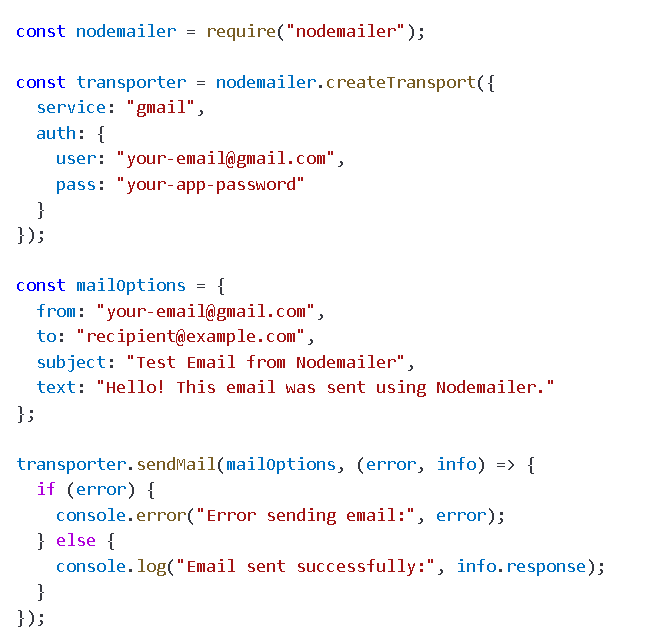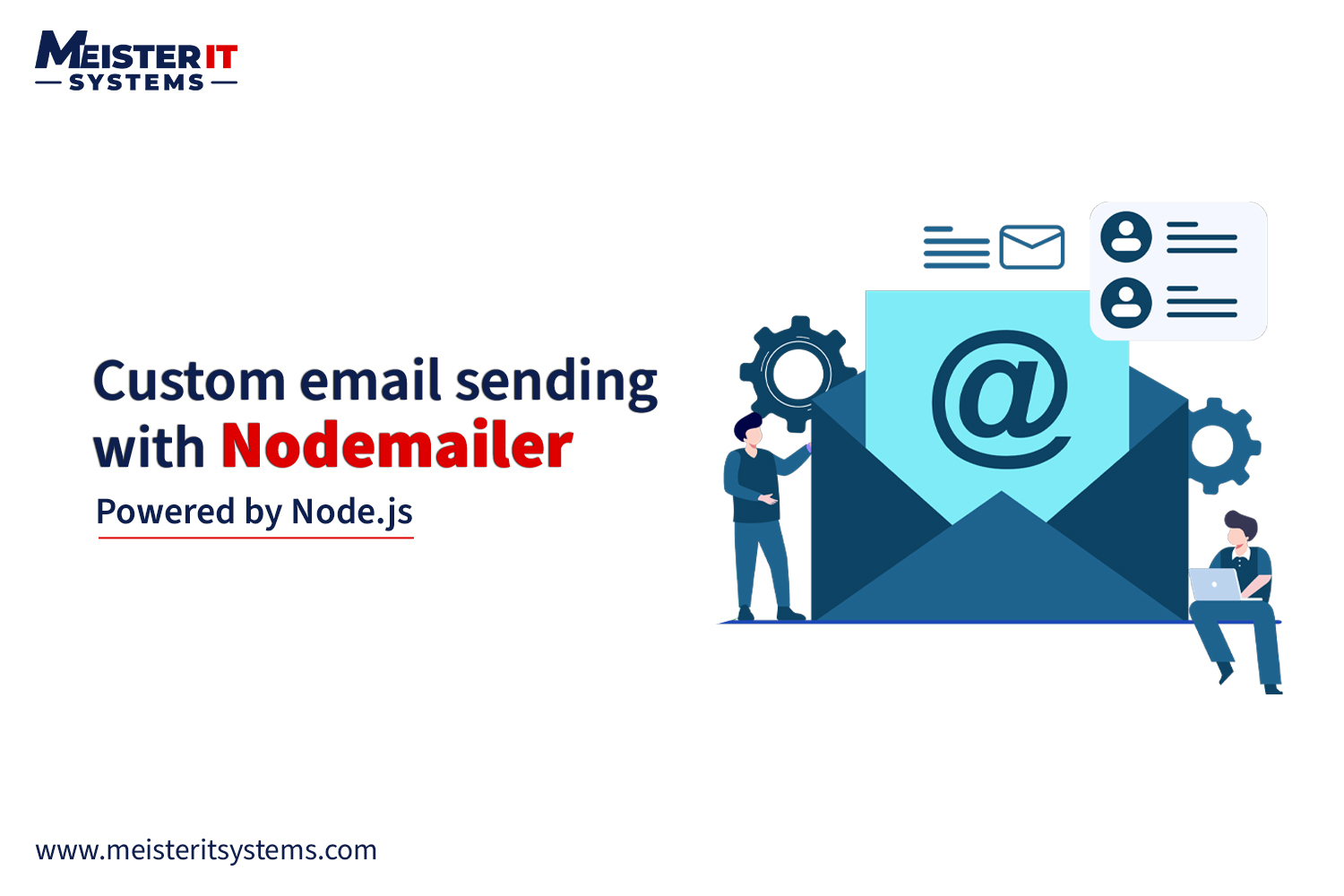Every day, over 300 billion emails are sent across the globe.
In a world of instant messaging and push notifications, email still holds its ground as the most reliable and trusted form of communication, especially for transactional and critical messages. For developers working with Node.js, finding a seamless and efficient way to integrate email functionality is key.
That’s where Nodemailer steps in. This powerful yet simple library streamlines the process of sending emails, offering a flexible and cost-effective solution for your applications.
Let’s explore how Nodemailer can become a strategic asset for your business.
What is Nodemailer?
Nodemailer is a Node.js library that allows developers to send emails directly from their applications. It supports SMTP and third-party email services like Gmail, Outlook, Amazon SES, Mailgun, and more.
From a business perspective, it provides a simple, cost-effective way to integrate email capabilities into digital products. For developers, it offers a minimal setup and a highly flexible API that supports everything from plain text to complex HTML templates and attachments.
Why Email Still Matters in 2025?
Despite the rise of chat apps and push notifications, email remains the most consistent and trusted medium for transactional and system-critical messages. It is secure, traceable, and expected by users for things like:
- Account creation and password resets
- Purchase confirmations and receipts
- System notifications and alerts
- Legal or regulatory communication
Email remains a compliance-friendly and user-friendly communication layer. Choosing the right tool to send those emails is essential to user trust and product performance.
Why Nodemailer Is a Smart Choice?
Nodemailer is a simple and lightweight tool that makes sending emails from your Node.js app easy. Whether you're a startup building your first product or a growing business scaling communication, Nodemailer gets the job done smoothly.
Let’s see why it’s a smart choice.
1. Simple Setup and Fast Integration
One of the biggest advantages of Nodemailer is that it can be set up with just a few lines of code. There is no need for complex configurations or dependencies. This reduces development time and speeds up your time-to-market.
2. Supports Multiple Transport Methods
Nodemailer allows you to choose how you want to send emails. You can use:
- SMTP (Simple Mail Transfer Protocol)
- OAuth2 authentication
- APIs from providers like SendGrid, Mailgun, or AWS SES
This flexibility gives engineering teams the freedom to optimize for cost, deliverability, or infrastructure constraints.
3. No Vendor Lock-In
Since Nodemailer works with any SMTP service or external provider, it does not tie your team to a single vendor. This is ideal for companies that want more control over email infrastructure or need the ability to switch providers later without reengineering their codebase.
4. Rich Email Capabilities
Nodemailer supports:
- Plain text and HTML content
- File attachments
- Embedded images and media
- Custom headers
This makes it suitable for both simple transactional emails and fully branded, responsive email templates.
How to Use Nodemailer: A Developer’s View
Here is a quick look at how simple it is to set up and use Nodemailer in a Node.js application.
Step 1: Install Nodemailer

Step 2: Configure and Send

This is all it takes to integrate email functionality into a live product. For more advanced needs, you can connect it with templating engines or background workers.
Where It Fits: Technical and Business Use Cases
Nodemailer fits perfectly into early-stage prototypes, internal tools, SaaS products, and enterprise platforms. Here’s how it supports different stakeholders:
Developers
- Integrate email into sign-up flows or notifications
- Trigger emails based on events using background jobs
- Customize content using templates or condition-based logic
Product Managers
- Test and launch user flows faster
- Iterate and scale communication without waiting for third-party setup
- Validate email behavior during QA and staging
CTOs and Founders
- Maintain control over infrastructure
- Avoid overpaying for full-fledged ESPs when a simple solution works
- Enable the team to move fast with minimal tech debt
Common Challenges Solved by Nodemailer
Here are common challenges solved by Nodemailer:
| Problem | Nodemailer’s Approach |
|---|---|
| SMTP complexity | Abstracts setup with helper methods and preset configs |
| Spam filters | Supports authentication headers like SPF and DKIM |
| Lack of templating | Integrates with popular template engines |
| Scaling delivery | Can be paired with background queues or email APIs |
When combined with best practices like queue-based email processing and using services like AWS SES for high deliverability, Nodemailer scales surprisingly well.
Security and Compliance Considerations
While Nodemailer itself is secure, developers should implement the following practices to protect credentials and user data:
- Use environment variables for storing email credentials
- Prefer OAuth2 over basic auth when using Gmail or Microsoft services
- Monitor email delivery rates and error logs
- Implement retry logic and failure tracking
Additionally, always make sure your infrastructure complies with GDPR, CAN-SPAM, and similar regulations when sending emails.
When to Consider Alternatives
Nodemailer is ideal for most transactional and low-to-medium volume email needs. However, for high-volume marketing campaigns or use cases that require advanced analytics, automation, or A/B testing, dedicated ESPs (Email Service Providers) are more appropriate.
Consider alternatives like:
- SendGrid or Mailgun SDKs for analytics and deliverability tracking
- Mailchimp or ConvertKit for bulk email campaigns
- Postmark for ultra-fast transactional email delivery
You can also use Nodemailer in combination with services like Amazon SES or SendGrid to retain code-level control while benefiting from their infrastructure.
Real-World Application: A Use Case from a Fintech Startup
A fintech startup needed to send real-time account alerts and transaction receipts. Instead of integrating a third-party marketing platform, their team implemented Nodemailer using AWS SES for delivery.
This allowed them to:
- Reduce monthly costs by 40%
- Achieve consistent delivery in under 2 seconds
- Maintain all logic within their backend system
This example shows how even high-performing, security-focused industries rely on developer-first tools like Nodemailer.
Final Thoughts: Is Nodemailer the Right Choice?
If you're building with Node.js and need a reliable, cost-effective way to send emails, Nodemailer is a strong contender. It's easy to implement, flexible enough for a range of use cases, and gives your team control without adding complexity. From developers to product leads, it’s a tool that supports fast, secure, and scalable growth.
At MeisterIT Systems, we help businesses build robust applications with smart backend choices like Nodemailer.
Need help integrating email capabilities or scaling your infrastructure?
Connect with our team and explore how we can support your product goals.
